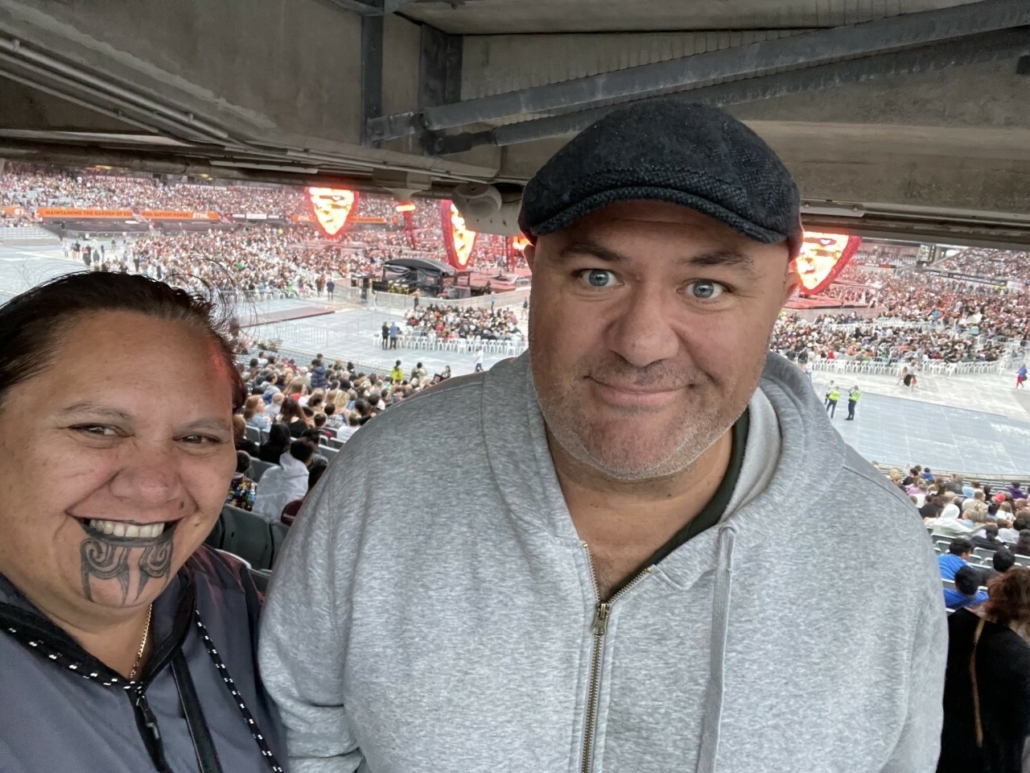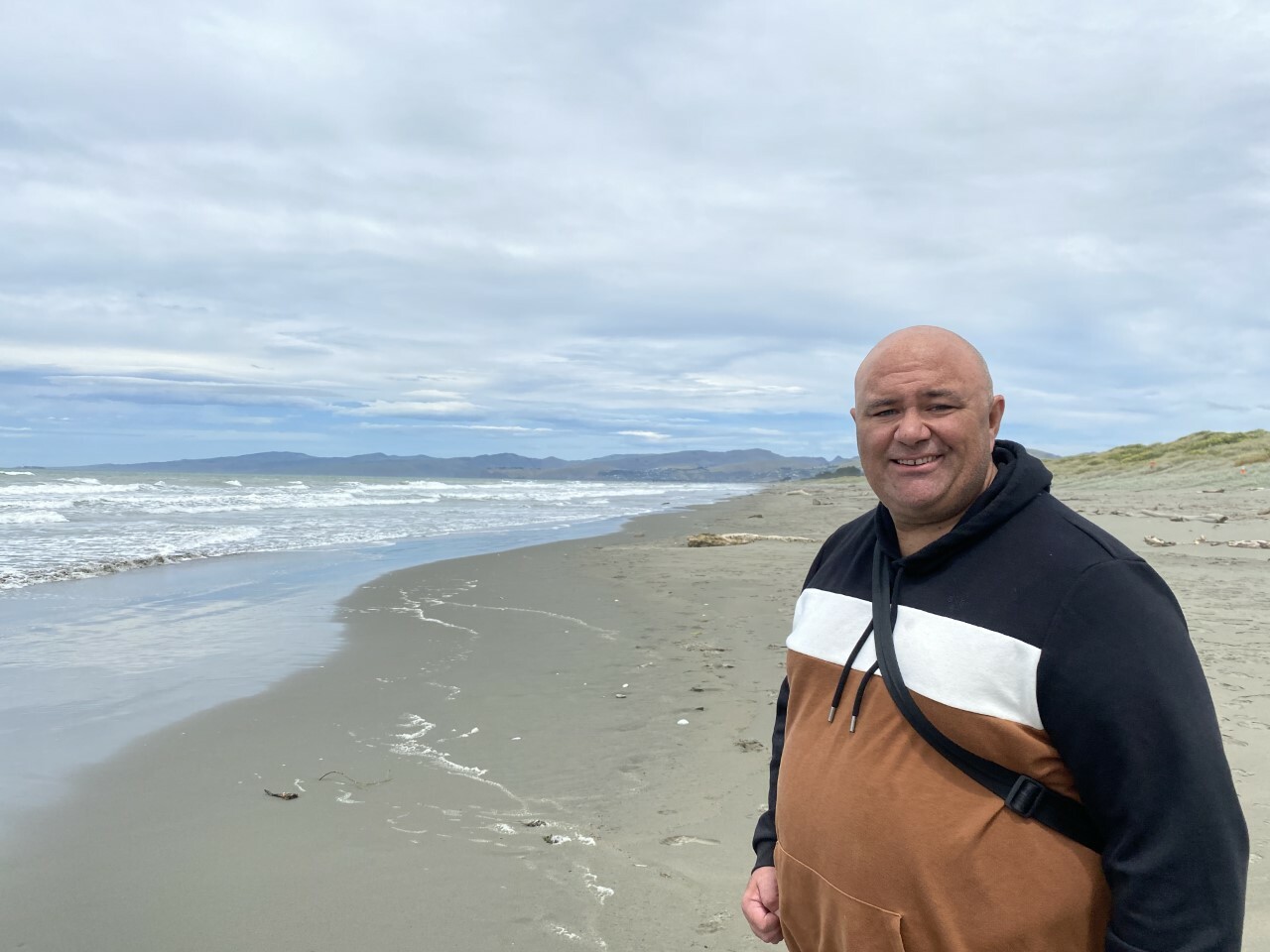Unlocking the knowledge – Matiu’s story
At the Laura Fergusson Brain Injury Trust, we don’t just help those with traumatic brain injuries, but a wide range of injuries, from spinal, to acquired brain injuries. Matiu Payne is a client involved in a broad range of services at LFBIT after suffering a stroke in 2021. Here, Matiu shares his story of working to unlock the important knowledge within him, twenty months after his stroke. Matiu’s wife Dione has been his number one support and key advocate and she also contributes to this story.
Prior to his stroke, Matiu found himself incredibly busy. Matiu is of Ngāti Kinohaku and Ngāti Mutunga descent and enjoyed being involved with these iwi wherever possible, including attending wānanga and supporting his children to maintain whakapapa connections to these areas.
Matiu was a chair of one of the eighteen Rūnaka in Kāi Tahu, over in Koukourarata (Port Levy). This meant he oversaw the development of the Rūnaka’s social and commercial development and supported the hapū to develop and implement their aspirations.
He also ran his own company Hākari Rau, which ran several projects within the community. He was also a lecturer at Lincoln University as an expert in all areas of mahika kai. But, outside of work, he looked after the cultural aspects of his hapū. This involved taking care of the marae, all of the karakia, and the passing of Mātauraka Māori. All of these roles sat with Matiu, he was the one person that others would turn to, and the one to support the next generation.
Matiu’s busy life was suddenly put on pause, as a stroke caused a range of challenges for Matiu, including a right hemiplegia (half of his body didn’t work) and aphasia (language difficulties).
Two kaumātua who have provided vital support to Matiu are Matua Ruawhitu Pokaia and his wife Whaea Marisa. They have provided constant support from the time of his stroke by leading and facilitating karakia every night for four months until his discharge from Burwood Hospital, to their current cultural and spiritual support through continued engagement, support with te reo and karakia. Other kaumatua that have been important to him are Matua Henare Te Karu and his wife Whaea Miriama from Te Runaka ki Ōtautahi o Kai Tahu, Whaea Reihana (Doe) Parata, from his hapu at Rapaki, Ngati Wheke and Rik Tainui from Onuku Runaka who provided his whānau accommodation support while he was in Christchurch Hospital fighting to stay alive.
Matua Ruawhitu was also instrumental in paving the way for Matiu to utilise one of the kaumātua flats at Rehua Marae to support his range of rehabilitation support. The support from the Kāhui Kaumātua at Rehua and the Board has meant that Matiu has been able to access support from Laura Fergusson Brain Injury Trust throughout the week for the past 20 months. Without the support of Rehua Marae, Matiu does not believe his progress would be as far along as it’s been.
Communication was one of the most significant challenges for Matiu following his stroke. Matiu now has aphasia, which affects his ability to express and understand verbal and written language, not only in English, but also Te Reo Māori. This is especially significant, as his role and culture is founded on transmitting through language, more often orally rather than written. Matiu is one of the people given historical and geological information, and he has found himself in a position where it feels stuck in his mind. So, Matiu’s main goal in rehabilitation is to unlock this information.
Beyond the challenges in communication, Matiu is working hard to regain control of his body. Autonomy in things like driving a car was taken away, but through working with his physiotherapist, he has been able to work first on things like getting up off the ground, and now walking. He has even had some recent trips to have a walk on the beach.
“It was fantastic. I got to get up and out there,” says Matiu. “I saw the beach at Waimairi, the whole thing was wonderfully good. I didn’t get to do it for nineteen months. That felt wonderful.”
To aid with his physical rehab, Matiu is also receiving acupuncture twice a week, which Matiu says is having an amazing impact on his body.
Matiu works well with his rehab coach, and occupational therapist (OT), to help with everyday tasks such as opening and closing curtains, dressing, cooking and leisure activities such as carving. He has recently passed a driving assessment with help from his OT and is now well on his way to returning to driving in a modified vehicle. In the meantime, Matiu happily taxis to and from LFBIT, after a long time of having services come to him.
Matiu also meets with a psychologist on a fortnightly basis to help him adjust to life after a stroke and develop strategies to deal with his emotions.
“They were all very good with me, teaching me how to manage that. I love going to see them, they’re really good. When you’re talking to the team, it feels like they are giving everything they’ve got. They come along and they give me a good push.”
The most significant rehab Matiu takes part in is speech-language therapy, where he works one or two days a week practicing everyday communication in real life by travelling to cafes, the library, shops and supermarkets. At first, Matiu found this to be a daunting task, but now he says some of the challenges he initially felt, he doesn’t even think about anymore.
“So my words were very small, I could only just share my name, but my speech-language therapist Del just gave me a good nudge and gives me the hope and strength that I need that I didn’t have from within.”
Matiu’s wife, Dione says the impact of his hard work in speech-language therapy has already shown itself in multiple ways.
“The confidence he has gained through speech-language therapy has been huge. There was a major funeral here at the Rehua Marae; there were hundreds of people that came through. Ordinarily, Matiu would stay home. But he walked us over to the marae, sat for two days, and communicated with hundreds of people, all in Te Reo. He would stay for about four or five hours and then come back for a sleep. He kept his door open and people were coming in and out; he got to watch the kapa haka and enjoy the food. If he hadn’t had the previous twelve months of engagement in the community through speech-language therapy, he would never have been able to be a part of it.”
Matiu has also managed to have a few trips overseas, engaging with family in the North Island, and even to Melbourne and Sydney in Australia. Matiu hopes to continue travelling out into the community, which feels even greater now, as he no longer needs a wheelchair to maneuver, giving him further autonomy and freedom.
Looking to the future, Matiu has a large list of goals that he hopes to achieve. So, he is excited to see what the next six months bring, with the increased independence and progress that he may make in that time.
“I think about how hard he’s worked with all of you guys, and I’m like gosh, I am blessed,” says Dionne. “Things can go in different ways if you don’t have the phenomenal spirit that this guy has. The silver lining is that Matiu’s stroke has given us more time to spend together and appreciate each other, away from the busyness of life.”
Matiu knows that he cannot rush back into his mahi, but is excited to begin finding ways back into it, and to open the door to the knowledge he has to share. He is going to begin working with Te Reo tutors to further support his language progress. Thank you so much for taking the time to share your story with us Matiu, and we can’t wait to continue supporting you to reach your goals!



